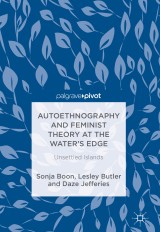Details

Autoethnography and Feminist Theory at the Water's Edge
Unsettled Islands|
74,89 € |
|
| Verlag: | Palgrave Pivot |
| Format: | |
| Veröffentl.: | 31.05.2018 |
| ISBN/EAN: | 9783319908298 |
| Sprache: | englisch |
Dieses eBook enthält ein Wasserzeichen.
Beschreibungen
<p>This book takes an intimate, collaborative, interdisciplinary autoethnographic approach that both emphasizes the authors’ entangled relationships with the more-than-human, and understands the land and sea-scapes of Newfoundland as integral to their thinking, theorizing, and writing. The authors draw on feminist, trans, queer, critical race, Indigenous, decolonial, and posthuman theories in order to examine the relationships between origins, memories, place, identities, bodies, pasts, and futures. The chapters address a range of concerns, among them love, memory, weather, bodies, vulnerability, fog, myth, ice, desire, hauntings, and home.</p>
<p><i>Autoethnography and Feminist Theory at the Water’s Edge </i>will be of interest to students and scholars across a range of disciplines including gender studies, cultural geography, folklore, and anthropology, as well as those working in autoethnography, life writing, and island studies.</p>
<p> </p><br>
<p><i>Autoethnography and Feminist Theory at the Water’s Edge </i>will be of interest to students and scholars across a range of disciplines including gender studies, cultural geography, folklore, and anthropology, as well as those working in autoethnography, life writing, and island studies.</p>
<p> </p><br>
<p>1. Introduction: Islands of the Imagination.- Part 1: Origins.- 2. Myths: Fishy.- 3. Hauntings: Love.- 4. Histories: Roots.- 5. Memories: Mud.- 6. Futures: Unfrozen.- Part II: Geographies.- 7. Land: Landscape.- 8. Water: Flooding Memory.- 9. Weather: Fog Trouble.- 10. Erosion: Fugitivity.- 11. Place: Re/Mapping.- Part III: Languages.- 12. Colonialism: Ruins.- 13. Histories: Stitching Theory.- 14. Proximity: Silence.- 15. Bodies: S/kinships.- Part IV: Longings.- 16. Desire: Mummeries.- 17. Home: Islandness.- 18. Vulnerability: Refusal.- 19. Intimacy: Torn.- 20. Belongings: Stumble.</p>
<p> </p>
<p><br></p>
<p> </p>
<p><br></p>
<p>Sonja Boon is Associate Professor of Gender Studies, Memorial University of Newfoundland, Canada.</p>
<p>Lesley Butler is a Master of Gender Studies candidate, Memorial University of Newfoundland, Canada.</p>
<p>Daze Jefferies is a Master of Gender Studies Candidate, Memorial University of Newfoundland, Canada.</p><br>
<p>Lesley Butler is a Master of Gender Studies candidate, Memorial University of Newfoundland, Canada.</p>
<p>Daze Jefferies is a Master of Gender Studies Candidate, Memorial University of Newfoundland, Canada.</p><br>
<p>This book takes an intimate, collaborative, interdisciplinary autoethnographic approach that both emphasizes the authors’ entangled relationships with the more-than-human, and understands the land and sea-scapes of Newfoundland as integral to their thinking, theorizing, and writing. The authors draw on feminist, trans, queer, critical race, Indigenous, decolonial, and posthuman theories in order to examine the relationships between origins, memories, place, identities, bodies, pasts, and futures. The chapters address a range of concerns, among them love, memory, weather, bodies, vulnerability, fog, myth, ice, desire, hauntings, and home.</p><p><i>Autoethnography and Feminist Theory at the Water’s Edge </i>will be of interest to students and scholars across a range of disciplines including gender studies, cultural geography, folklore, and anthropology, as well as those working in autoethnography, life writing, and island studies.</p><p> </p><div><br></div>
Brings cutting edge work in feminist geographies, feminist posthumanisms, feminist materialisms, trans studies, critical race theories, and Indigenous studies into conversation with one another Uses a collaborative autoethnographic approach Blends critical and creative writing strategies, creating texts which are both critical and lyrical
“<i>Autoethnography and Feminist Theory At the Water’s Edge: Unsettled Islands</i> offers an exciting and entirely new approach to writing feminist theory. Its collaborative authorial voice meditates on a range of timely critical issues such as settler colonial histories, gender embodiment, affective memory, community identity and senses of belonging. The book’s feminist insights are grounded in intimate autoethnographic details and vivid evocations of place. The reader can practically smell the salty island air and feel the fear of stepping on fragile slabs of ice! Comprising a series of ‘micro essays,’ the book’s pleasing economy belies the depth of its historical research and the richness of its theoretical arguments. It is a beautiful and thoughtful work that deserves to be widely read and unreservedly loved.” (Helen Leung, Simon Fraser University, Canada)<p>“Like their subject matter itself, the short lyrical essays in this volume compel readers to new understandings of bodies and identities through encountering islands as simultaneously material and metaphor. Throughout, time and space are fluid and liminal, and theory is complex while also embodied and personal. As someone who lives on an island, I was swept into other mappings, other ways of knowing that are both grounded and able to let go, to follow ‘waves’ and ‘roots’ in a multitude of directions. Boon, Butler, and Jeffries have created provocative and beautiful essays that take readers to the ‘edge’—of, and beyond, land and sea, history and possession, belonging and longing. Here, autoethnography and critical memoir are journeys through dense and layered stories that embark us all on re/considerations of our locations and located-ness. A short and powerful collection!” (Ann Braithwaite, University of Prince Edward Island, Canada)</p><p>“In this fierce assemblage of essays, Boon, Butler, and Jeffries offer us 'theory at the water’s edge'—a vibrant creative scholarship of roots, waves, and passages. Designed as an archipelago, these pieces dwell on knotted issues of autoethnography through elemental perspectives, including fog, ice, and 'wet ways of knowing.' As a work of collaborative inquiry, the book delivers vibrant nonbinary perspectives on feminist geography and Newfoundland/Ktaqmkuk as unceded territory. The authors queer archival practices, while encouraging us to put our own bodies on the line as scholars. The result is a beautiful entanglement of decolonial thought, critical memoir, and physical embodiment that invites readers to think beyond binaries to the possibility of water. The analysis is personal, political, and radical in its 'torn cartographies,' which submerge and re-map the reader.” (Jes Battis, University of Regina, Canada)</p><br>

















